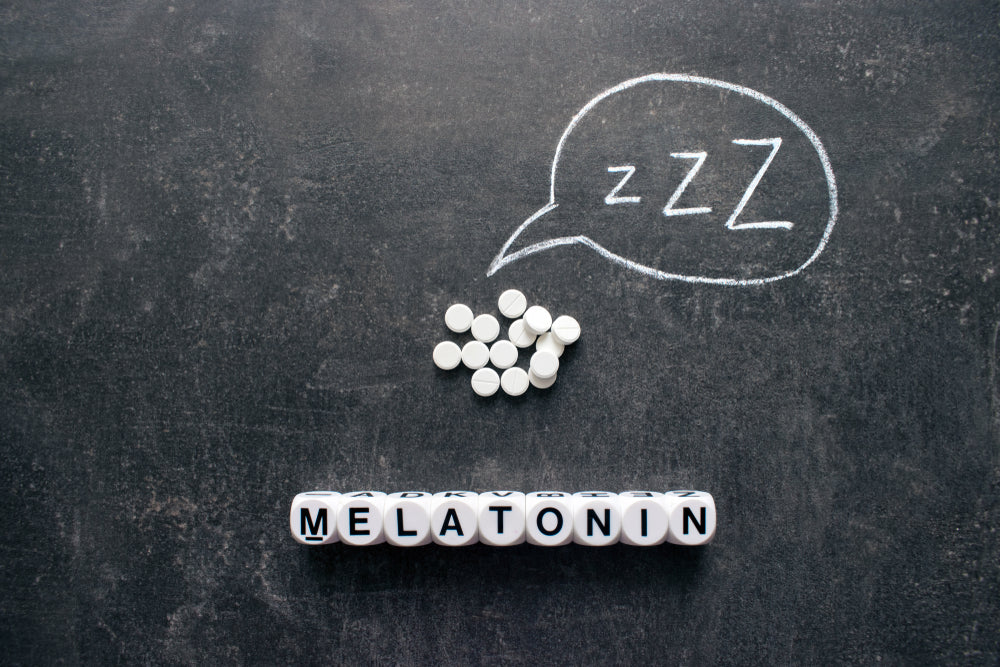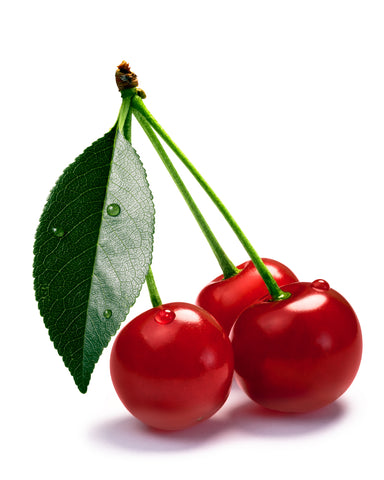Odds are if you’ve ever experienced sleep issues, you’ve either tried or at least entertained using a melatonin supplement for sleep.
Because as everyone knows: melatonin helps you fall asleep.
Nothing much more to it than that.
And, yet, even so, many people who have tried a melatonin supplement (or who have entertained trying one but ultimately decided against it) have also turned away from melatonin...
...due to the common side effects of excess morning grogginess, drowsiness, and headache.
In other words, many melatonin supplements tend to work too good, in a sense...
Many sleep aid supplement manufacturers are at fault for one of 3 common issues:
- Supply too much melatonin per dosage, or
- Supply synthetic melatonin, which is unpredictable compared to natural melatonin.
- Or, more often than not, they supply both overdosed AND synthetic melatonin.
Performance Lab® Sleep, on the other hand, supplies all-natural melatonin, sourced from tart cherry extract, at a minimally effective dosage that won’t encroach upon your daytime energy and productivity.
Quite the opposite, in fact: paired with L-tryptophan and magnesium, Performance Lab® Sleep’s natural melatonin actually works to the benefit of your daytime productivity.
All-natural, pure, potent sleep enhancement - Performance Lab® Sleep far outranks the standard over-the-counter (OTC) sleep aid. Making it the best melatonin for sleep supplement.
However, to understand exactly what makes Performance Lab® Sleep better than other melatonin-powered sleep aids, we’ll need to first address the basics.
The basics, such as:
What is Melatonin?

Simply put, melatonin is a key hormone secreted in the brain to encourage sleep.
More specifically, melatonin is a hormone secreted by the pineal gland in response to the nighttime absence of light, fulfilling the “sleep” portion of the 24-hour sleep-wake cycle.
Healthy, regular sleep patterns rely on the healthy, regular secretion of melatonin. Conversely, irregular sleep patterns (e.g., going to bed at irregular hours) correlate with the unhealthy, irregular secretion of melatonin.
Along with the sleep-wake cycle, this all falls under the concept of the circadian rhythm.
Key Point: The circadian rhythm is a natural, internal process that regulates the sleep-wake cycle, as well as any other biological process regulated by the body’s internal clock.
Because we live in such a screen-lit world, with computer and phone screens that emit “blue” light rays similar to those emitted from the sun, it’s becoming increasingly difficult for the brain to commit to a healthy, regular melatonin secretion schedule.
As a result, much of the circadian rhythm and its dependent metabolic functions suffer, resulting in all-around metabolic disorder.
This is a huge part as to why melatonin supplementation has become so appealing. Not to mention effective, to sleep-deprived workers, students, athletics, etc. of the modern world.
However, with that in mind, there are also plenty of natural food options available to us to increase our daily melatonin intake.
Natural Sources
Because so many people take synthetic melatonin supplements as sleep aids, it’s easy to forget that melatonin is a naturally secreted neurochemical.
What’s more, it’s also a dietary nutrient that, as we age, becomes more and more essential, due to the decline in natural melatonin secretion in the brain.
A few of the top natural food sources of melatonin include:
- Montmorency Tart Cherry – the best natural source of melatonin, tart cherries are rich in sleep-supportive melatonin and joint-soothing antioxidants.
- Grapes – related to the tart cherry, many grapes also contain bioavailable amounts of melatonin beneficial to the sleep-wake cycle.
- Eggs and Fish – of the animal foods, eggs and fish possess the greatest amounts of melatonin, in addition to brain healthy omegas, choline, and vitamins.
- Nuts – walnuts, pistachios, and cashews possess a considerable amount of melatonin, as well as essential minerals magnesium and zinc.
- Pigmented Rice – most notably, nonglutinous black rice possesses roughly twice the amount of melatonin as the glutinous type.
- Cereals – aside from black rice, other cereals such as wheat, barley, and oats supply relatively high amounts of natural melatonin.
- Legumes and Seeds – many legumes and seeds have a high concentration of melatonin; and the germination process of legumes and seeds may significantly increase their melatonin levels.
Related Post: What is the Most Effective Natural Sleep Aid?
Take note: it’s not necessarily important that you consume these melatonin-rich food sources directly before bed; although research does suggest that drinking tart cherry juice both in the morning and immediately prior bedtime may help promote sleep time and efficiency.
Really, what’s important is simply getting enough food-sourced melatonin in your daily diet for you to earn the sleep benefits, whether you’re consuming your dietary melatonin for breakfast, lunch, or dinner.
Melatonin Benefits for Sleep

Melatonin alone won’t put you to sleep. Really, what this “sleep hormone” does is signal to your brain and body that “it’s nighttime, so we should probably chill out and get ready for sleep.”
In a naturally lit environment (i.e., sunlit), when the sun goes down, melatonin releases.
The bad news is that the modern world is very hostile to melatonin.
Highly dependent on the cyclical 24-hour rhythms of nature, the circadian rhythm is also easily swayed by the unnatural light emitted from our TV screens, computer screens, phone screens, etc.—all the electronic screens that light our faces in the evening, preventing the natural secretion of melatonin.
When melatonin fails to secrete, we fail to fully fall asleep, resulting in an off-balance circadian rhythm, the downsides of which are many.
With that in mind, the benefits of healthy melatonin activity are also many, including:
Healthy Circadian Rhythm
More specifically, a healthy sleep-wake cycle, the metabolic pathways regulated by the circadian rhythm pertaining to …well, to sleeping and waking.
As the hormone that signals “sleepy-time,” melatonin acts as a sort of anchor point for the “sleep” portion of the sleep-wake cycle. This means that the more regular and consistent your melatonin activity, the more stable your sleep-wake cycle.
However, if you “loosen” your melatonin anchor by sleeping at irregular hours and exposing yourself to too much electronic screen-light in the evening, your sleep-wake cycle suffers and, along with it, your circadian rhythm.
Therefore, melatonin is key to a healthy circadian rhythm.
Faster Sleep Onset
Naturally, without an adequate melatonin response prior to bedtime, falling asleep can be annoyingly troublesome.
Tossing and turning all night, all the while feeling anxious that you’re not falling asleep (which in turn only makes sleep a greater impossibility)—this is something we’ve all experienced and that we all, to some degree, dread.
By signaling to the body that it’s “time for bed,” melatonin helps get your brain and body with the program, significantly reducing sleep onset latency for an increase on total sleep time and overall sleep quality.
Better Overnight Recovery
Rest and recovery are just as important to physical performance as exercise and activity.
Naturally, melatonin assists with rest and recovery via its REM sleep-supportive biomechanisms; however, the “sleep hormone” may also improve overnight recovery (say, from daily exercise) by encouraging the activities of growth hormone (GH) and insulin-like growth factor 1 (IGF-1).
This is also why many athletes supplement magnesium for sleep: daily exercise depletes sleep-essential minerals, such as magnesium, making magnesium supplementation key for physical performance enhancement and recovery.
Paired with magnesium, melatonin is essential for sustaining a healthy, active lifestyle.
Can Melatonin Supplements Improve Sleep?
Yes, melatonin supplements can help improve sleep.
Because melatonin secretion is greatly affected by light (or the lack thereof), melatonin supplementation has been seen as increasingly important to those living in unnaturally lit environments.
Nighttime use of electronic devices and artificial “blue” light suppresses the natural release of melatonin, disrupting healthy, natural sleep and long-term sleep patterns.
Because melatonin is a “natural” acting hormone, dietary sources of melatonin (including melatonin supplements) may offer a more “natural” approach to getting better sleep. At least more so than the risky, synthetic “sedative” options available to us.
With that in mind, however, it’s important to distinguish natural melatonin from synthetic melatonin—a common type of supplementary melatonin linked to several side effects.
What are the Side Effects of Melatonin?
For the most part, side effects of melatonin are mild and easily mitigated through the use of natural melatonin at a minimally effective dosage.
However, the problem is: many sleep aid companies sell synthetic melatonin at excessive dosages.
Briefly, the common side effects of melatonin include:
- Morning Headache
- Excessive Grogginess
- Drowsiness
- Dizziness
- Nausea
- Fatigue
- Irritability
- Stomach Discomfort
- Mood Imbalance
Typically, taking too much melatonin results in the sleep-supportive effects of this hormone overstaying their welcome come morning time.
Though we’ll dive into greater detail on the differences between synthetic vs. natural melatonin below, it’s worth noting here that synthetic melatonin is particularly risky due to the unpredictable potency of the synthetic stuff.
The unpredictability of synthetic melatonin perhaps explains why customers buy melatonin supplements at dosages that are 10X higher than the ideal dosage.
Optimal Melatonin Dosage
The ideal dosage of natural melatonin is 0.3 mg.
If that seems surprisingly low, this is likely because you’re used to seeing melatonin supplements with dosages upwards of 3-5 mg.
Needless to say, if 0.3 mg is the optimal melatonin dosage, then 3 mg is too much.
And though “too much” here might sound appealing if you’re trying to get really, really good sleep, research has found the much lower amount of 0.3 mg to actually be more effective than 3 mg for promoting restful sleep within the threshold of “normal physiological circadian rhythm.”
Natural Sources vs Synthetic Melatonin
Many supplement buyers are still unaware that the melatonin they’re buying isn’t the real deal.
Though, yes, synthetic melatonin still possesses more or less the same bio-benefits as natural melatonin, the artificial stuff differences from the natural stuff in a couple key ways:
- Potency – as opposed to standardized concentrations of naturally sourced melatonin, synthetic melatonin tends to unpredictably vary in terms of bioavailability; some servings work, others do, and others still do way too much, despite them all sharing the same dosage.
- Dosage – speaking of dosage, many synthetic melatonin supplements are dosed way too high, perhaps as compensation for the unreliable potency of synthetic melatonin, resulting in an unhealthy flush of melatonin activity.
Earlier in this article, we listed several natural dietary sources of melatonin you can take to increase your natural melatonin levels.
Of those listed foods, the best for sleep and overnight recovery is:
Montmorency Tart Cherry:
Natural Melatonin Source for Sleep

The richest natural source of melatonin, Montmorency tart cherry is a popular traditional sleep aid, with additional joint and connective tissue benefits thanks to tart cherry’s rich supply of anthocyanin antioxidants.
Melatonin-rich Montmorency tart cherry seems to support sleep by:
- Mimicking the sedative effects of pre-bedtime darkness to encourage quicker sleep onset and overall longer sleep duration.
- Combatting melatonin disruptions associated with nighttime use of blue light-emitting electronic screens.
- Anchoring the circadian rhythm around a reliably scheduled increase in bioavailable melatonin with consistent use.
Not to mention that Montmorency tart cherry’s anthocyanin antioxidant content may help support sleep, as well as recovery, by soothing achy muscles and joint tissues.
This makes Montmorency tart cherry a powerful recovery agent as much as an effective sleep aid—a smart choice for athletes and exercisers with heightened bodybuilding demands.
But not all Montmorency tart cherry sources are the same.
For effective, reliable sleep quality enhancement, go for the best tart cherry extract for sleep: CherryPURE®.
CherryPURE®
A significant upgrade over raw tart cherry juice, CherryPURE® is a freeze-dried Montmorency tart cherry powder concentrated to a highly potent 50:1 extract.
For every 500 mg, CherryPURE® supplies the bioavailable equivalent of 25 g of Montmorency tart cherries, delivering a purer, more convenient supply of natural melatonin and fruit antioxidants.
What’s more, CherryPURE® is the only tart cherry dietary supplement backed by brand-specific human clinical research.
As one promising study from Texas A&M notes, 480 mg of CherryPURE® taken before and after intense strength training has been suggested to help “attenuate muscle soreness, strength decrements during recovery, and markers of muscle catabolism in resistance trained individuals.”
Taken in conjunction with L-tryptophan and magnesium in the best all-in-one natural melatonin sleep supplement—Performance Lab® Sleep—CherryPURE® may go a long way in protecting a healthy circadian rhythm while encouraging better bodybuilding results and athletic performance.
Best Natural Melatonin Supplement:
Performance Lab® Sleep

An ultramodern sleep aid for our ultramodern world.
Performance Lab® Sleep utilizes the best of modern technology to formulate the most effective sleep supplement to date using only traditional, all-natural ingredients, including:
- Montmorency Tart Cherry – long used to promote better sleep and overnight recovery, Montmorency tart cherry supplies a rich extract of natural melatonin for better sleep quality and fruit antioxidants for enhanced tissue repair.
- L-Tryptophan – an amino acid used in the biosynthesis of serotonergic neurochemicals, L-tryptophan encourages better sleep, mood, and daytime productivity.
- Magnesium – a mineral of (literal) elementary importance to sleep and recovery, magnesium blocks excess neural activity, particularly within the neuromuscular junction to inhibit sleep-disruptive muscle twitches, spasms, and movements.
The combination of natural tart cherry melatonin with muscle-relaxing, ache-soothing, and stress-lowering L-tryptophan and magnesium makes Performance Lab® Sleep one of the most unique regenerative sleep enhancers for users of all lifestyles—whether athletic or academic, recreational or professional.
Get the Best Deal on Performance Lab® Sleep Here
Here are a few of the benefits you can expect with a nightly night-cap of Performance Lab® Sleep on your side:
Key Benefits
Whereas single-ingredient melatonin sleep aids take a blunt approach to sleep enhancement, Performance Lab® Sleep mixes a simple, yet diverse concoction of natural sleep aids for a variety of sleep and health benefits.
All in all, Performance Lab® Sleep works by:
- Encouraging pre-sleep drowsiness with natural melatonin to combat age- and technology-related melatonin deficiency.
- Accelerating sleep onset for greater sleep duration and depth, allowing the mind to fully relax without anxiously tossing and turning.
- Soothing sleep-disruptive muscle spasms, twitches, and involuntary movements in the middle of the night.
- Enhancing nighttime muscular and cellular renewal for greater overnight recovery and next-day performance.
Get the Best Deal on Performance Lab® Sleep Here
Not to mention the far-reaching cascade of health and fitness benefits associated with a healthy, consistent circadian rhythm.
With so many environmental factors standing between you and good night’s sleep, the long-term benefits of taking a natural sleep supplement can be genuinely life-changing—and in the good way. And, as opposed to the standard sleep supplement which is just as cheap and artificial as today’s screen-lit, sleep-disruptive environments, Performance Lab® Sleep is 100% all-natural inside and out, resulting in naturally enhanced sleep and recovery.
From the minimally effective melatonin dosage to the plant-based NutriCaps® capsules, Performance Lab® Sleep’s non-addictive formula is safe for long-term daily (er, nightly) use.

Conclusion
Is it possible for melatonin to vary in importance from year to year?
Can a hormone naturally produced by the body waver in terms of relevance over time?
Or can we trust in the stable production and balanced activity of all the chemicals and compounds circulating our body?
Of course, as we’re learning more and more, as our external environments shift, so, too, does our internal ecosystems.
The stress of living in uncertain times may throw your hormonal homeostasis way off, and, likewise, the unnatural exposure to artificial lighting and heightened work demands may significantly impair your natural ability to produce and secrete melatonin.
This is why all-natural sleep aids, such as Performance Lab® Sleep, are gaining increasing attention. To combat the unnatural environmental factors that are contributing to an unnatural inner ecosystem within our brains and bodies, we need all-natural supplementary aid.
With the best melatonin for sleep, CherryPURE® Montmorency tart cherry, stacked with L-tryptophan and magnesium (as NutriGenesis®), Performance Lab® Sleep delivers a formula suited for the ultramodern busybody who’s trying to navigate our ultramodern world.
Vegan-friendly, eco-friendly, non-GMO—Performance Lab® Sleep is safe for daily, long-term use without any risk of habit-forming effects or circadian disruption.
References
- Zisapel N. New perspectives on the role of melatonin in human sleep, circadian rhythms and their regulation. Br J Pharmacol. 2018 Aug; 175(16): 3190-3199.
- Hardeland R. Melatonin in Aging and Disease – Multiple Consequences of Reduced Secretion, Options and Limits of Treatment. Aging Dis. 2012 Apr; 3(2): 194-225.
- Meng X et al. Dietary Sources and Bioactivities of Melatonin. Nutrients. 2017 Apr; 9(4): 367.
- Losso JN et al. Pilot Study of Tart Cherry Juice for the Treatment of Insomnia and Investigation of Mechanisms. Am J Ther. 2018 Mar-Apr; 25(2): e194-e201.
- Brown GM. Light, melatonin and the sleep-wake cycle. J Psychiatry Neurosci. 1994 Nov; 19(5): 345-353.
- Ferracioli-Oda E et al. Meta-Analysis: Melatonin for the Treatment of Primary Sleep Disorders. PLoS One. 2013; 8(5): e63773.
- Stacchiotti A et al. Impact of Melatonin on Skeletal Muscle and Exercise. Cells. 2020 Feb; 9(2): 288.
- Valcavi R et al. Melatonin stimulates growth hormone secretion through pathways other than the growth hormone-releasing hormone. Clin Endocrinol (Oxf). 1993 Aug; 39(2): 193-9.
- Tähkämö L et al. Systematic review of light exposure impact on human circadian rhythm. Chronobiol Int. 2019 Feb; 36(2): 151-170.
- Andersen LPH et al. The Safety of Melatonin in Humans. Clin Drug Investig. 2016 Mar; 36(3): 169-75.
- Vural EMS et al. Optimal dosages for melatonin supplementation therapy in older adults: a systematic review of current literature. Drugs Aging. 2014 Jun; 31(6): 441-51.
- Losso JN et al. Pilot Study of the Tart Cherry Juice for the Treatment of Insomnia and Investigation of Mechanisms. Am J Ther. Mar/Apr 2018; 25(2): e194-e201.
- Howatson G et al. Effect of tart cherry juice (Prunus cerasus) on melatonin levels and enhanced sleep quality. Eur J Nutr. 2012 Dec; 51(8): 909-16.
- Levers K et al. Effects of powdered Montmorency tart cherry supplementation on an acute bout of intense lower body strength exercise in resistance trained males. J Int Soc Sports Nutr. 2015; 12: 41.













